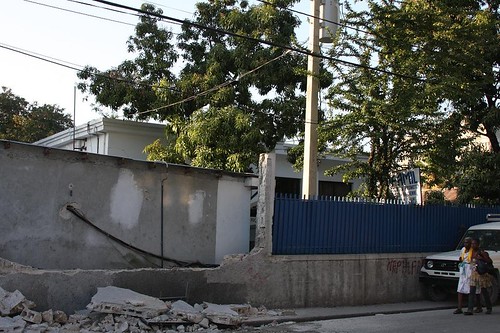Haiti warlord Jimmy ‘Barbecue’ Chérizier set to take advantage of power vacuum
Haiti #Haiti

The Haitian warlord Jimmy “Barbecue” Chérizier claims that his nickname was inspired by his mother’s grilled chicken street stand.
But critics of the 46-year-old former police officer have another explanation: he has a habit of setting fire to his opponents’ homes while they are still inside.
In one incident in 2018, 70 people were killed after he allegedly torched 400 houses in La Saline slum in the capital, Port-au-Prince.
Either way, the nickname has stuck.
Chérizier, a warlord who has unleashed a wave of bloodletting on Haiti, heads an alliance of brutal gangs that calls itself G9 Family and Allies.
After nearly two weeks of his men storming government buildings, police stations and Haiti’s largest airport, he has now managed to force out the shattered nation’s last remaining government figure, Ariel Henry, the prime minister.
Chérizier has been accused of multiple massacres, including while he was still in the notoriously corrupt Haitian National Police, from which he was fired in 2018.
He is now the subject of United Nations sanctions for alleged human rights abuses.
Typically sporting a beret, military camouflage and a machine gun, he likes to make public appearances posing as a Robin Hood-style figure fighting for the poor.
That is despite leading a crime empire that preys on ordinary Haitians, routinely engaging in robbery, extortion, kidnapping and rape.
‘Charismatic, brutal thug’
Part of Chérizier’s carefully curated do-gooder image has hinged on his violent opposition to the deeply unpopular Mr Henry, who failed to live up to his promises to hold elections.
“He is a charismatic, brutal thug,” says Dr Vanda Felbab-Brown, an expert on non-state armed actors, from US think tank the Brookings Institution.
“But Chérizier does have some legitimacy with some of the population, who have no choice about who rules over them at the minute. Unlike some other gang leaders, he does provide some social support to the poor.”
One of eight siblings born near La Saline and brought up singlehandedly by his mother after his father died when he was five, Chérizier claims to be a “revolutionary” seeking to overturn an unjust economic system based on “apartheid”.
He has also cited François “Papa Doc” Duvalier, the ruthless dictator who ruled Haiti from 1957 to 1971, as an inspiration.
Duvalier was notorious for his personality cult rooted in Haitian mythology and his “Tonton Macoute” death squads that crushed all dissent to his kleptocratic rule.
In 2021, Chérizier told looters ransacking businesses in Port-au-Prince: “It is your money which is in banks, stores, supermarkets and dealerships, so go and get what is rightfully yours.”
Long-term goals remain uncertain
As his power grew in the past three years, Chérizier and G9 engaged in ferocious turf wars with a rival group of gangs calling itself G-Pep, while Mr Henry watched on ineffectually.
It is that power vacuum that, ironically, allowed Chérizier to claim to be representing long-suffering ordinary Haitians by demanding Mr Henry’s resignation, which he has now provided.
The gang leader’s long-term goals remain uncertain. He was, says Dr Felbab-Brown, an ally of Jovenel Moise, the president whose 2021 assassination triggered Haiti’s latest downward spiral, and probably wants to align himself with any new government.
Under Moise’s administration, prosecutors were reported to turn a blind eye to G9’s drug trafficking and other crimes provided they maintained order in Port-au-Prince’s slums, often using unremitting violence.
But what is clear is that since founding G9 in 2020, Chérizier has – at the point of a gun – amassed significant power and wealth, which he now appears unwilling to relinquish.
As he once again demanded Mr Henry’s resignation last week, the gang leader, wearing a bulletproof vest, declared: “Either Haiti becomes a paradise for all of us or a hell for all of us.”
For ordinary Haitians, living in constant fear of a random act of gang violence, the latter outcome must seem far more likely than the former.
That is, in large part, thanks to Chérizier and his violent assault on Haiti’s collapsing state institutions.
Broaden your horizons with award-winning British journalism. Try The Telegraph free for 3 months with unlimited access to our award-winning website, exclusive app, money-saving offers and more.